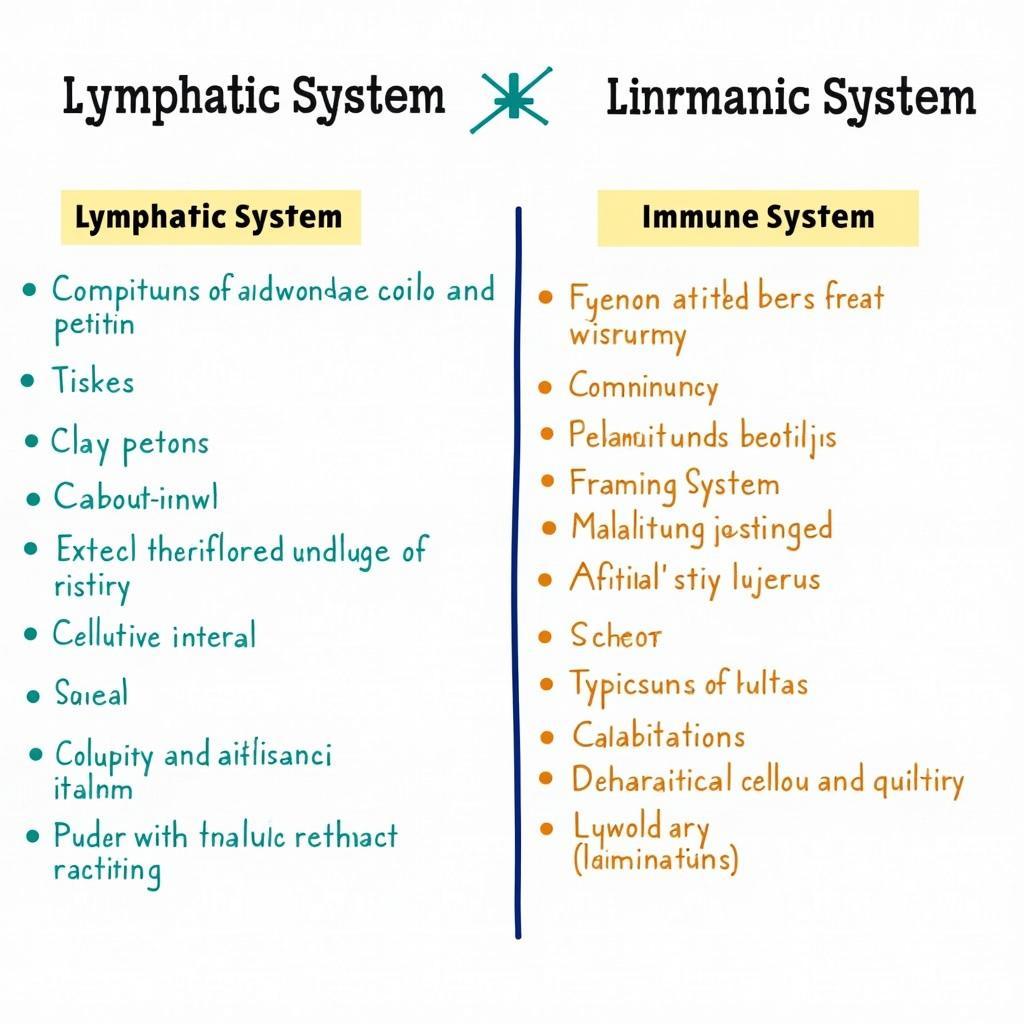The lymphatic system and immune system are often mentioned together, leading many to wonder about their relationship. What is the difference between the lymphatic system and the immune system? Are they the same thing? This article will explore the distinct roles of each system and how they work together to protect your body.
Decoding the Lymphatic System
The lymphatic system is a network of vessels and tissues that acts like the body’s drainage system. It carries a clear fluid called lymph, which contains waste products, bacteria, and other foreign substances. Lymph nodes, small bean-shaped structures located throughout the body, filter the lymph and remove these harmful materials. Think of them as checkpoints along the lymphatic highway.
Key Functions of the Lymphatic System
- Fluid Balance: The lymphatic system helps maintain fluid balance by collecting excess fluid from tissues and returning it to the bloodstream.
- Fat Absorption: It plays a crucial role in absorbing fats and fat-soluble vitamins from the digestive system.
- Waste Removal: The lymphatic system removes waste products, toxins, and cellular debris from the body.
- Immune Defense: Perhaps its most vital function, the lymphatic system supports the immune system by transporting immune cells and filtering out pathogens.
Understanding the Immune System
The immune system is a complex network of cells, tissues, and organs that work together to defend the body against harmful invaders. These invaders can include bacteria, viruses, fungi, parasites, and even cancerous cells. The immune system identifies and eliminates these threats, preventing infection and disease.
How the Immune System Works
The immune system employs various mechanisms to combat pathogens:
- Innate Immunity: This is the body’s first line of defense, a rapid and non-specific response to any foreign invader. It includes physical barriers like skin and mucous membranes, as well as immune cells like macrophages and neutrophils.
- Adaptive Immunity: This is a more specialized and targeted response that develops over time. It involves immune cells like lymphocytes (B cells and T cells) that recognize specific pathogens and mount a tailored attack. This type of immunity also creates memory cells, allowing the body to respond more quickly and effectively to future encounters with the same pathogen.
 Distinguishing Between Lymphatic and Immune Systems
Distinguishing Between Lymphatic and Immune Systems
The Synergistic Relationship: How They Work Together
While distinct, the lymphatic and immune systems are deeply interconnected. The lymphatic system provides the infrastructure for immune cell transport and interaction. Lymph nodes, strategically positioned throughout the body, act as hubs for immune activity. Here, immune cells encounter pathogens filtered from the lymph, initiating an immune response. This collaboration is essential for effective immune surveillance and protection.
Lymphatic System: The Immune System’s Highway
Imagine the lymphatic system as the highway system, transporting immune cells (the police) to the scene of an infection (the crime scene). Lymph nodes act as police stations along the way, where information is gathered and coordinated. This efficient transport and communication network is crucial for a swift and effective immune response.
Why is this important?
Understanding the distinct roles and the interconnectedness of the lymphatic and immune systems empowers individuals to take proactive steps towards better health. Supporting both systems through healthy lifestyle choices like balanced nutrition, regular exercise, and stress management can contribute to a robust and resilient immune response.
Conclusion: A Powerful Partnership for Health
The lymphatic system and immune system, while distinct in their functions, work in close collaboration to defend the body against disease. The lymphatic system provides the essential infrastructure for immune cell trafficking and interaction, while the immune system utilizes this network to effectively identify and eliminate pathogens. Understanding this dynamic duo is key to maintaining overall health and well-being.
FAQs
- What are the signs of a sluggish lymphatic system?
- How can I boost my lymphatic system naturally?
- What is the difference between lymph and blood?
- How does the immune system recognize “self” from “non-self”?
- What are the common diseases associated with the lymphatic system?
- How can I strengthen my immune system?
- What are autoimmune diseases and how do they relate to the immune system?
For further support, please contact us at Phone Number: 02838172459, Email: truyenthongbongda@gmail.com Or visit us at: 596 Đ. Hậu Giang, P.12, Quận 6, Hồ Chí Minh 70000, Việt Nam. We have a 24/7 customer support team.